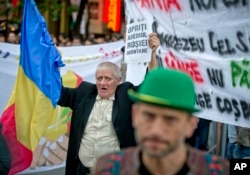Eugen David is a smallholder farmer who has been living in Rosia Montana, Romania, for the past 20 years.
He heard a mining company was coming in the early 2000's with a project that would relocate 2,000 people, demolish four mountain tops and create a waste pool of cyanide-laced water.
David did not want to be resettled and now heads a local association that opposes mining activity in the area. Protests against the mine project continued for more than 15 years and resulted in the largest demonstrations in Romania since the late 1980’s.
Romanian courts eventually said the given mining permits were obtained illegally and parliament labeled the mountainous area of Rosia Montana a historical heritage site to protect the area.
Project parent company Gabriel Resources decided to sue the Romanian state at a so-called ISDS, an investor state dispute settlement court. The first hearing took place in September.
David said he was shocked to learn about ISDS.
“We followed all the legal procedures and we showed that according to the rule of law, the Gabriel Resources’ project was illegal. Now they found a backdoor, the arbitration court; but, the Rosia Montana project should be dead and buried by now.”
Controversial procedures
ISDS is a controversial measure whereby foreign investors may sue a state at a secret arbitration for “damaging” their profits if the state has violated a trade deal or international law. Critics say ISDS is not transparent, that it gives more rights to corporations and infringes on human rights. Proponents say it protects investors.
Gabriel Resources, a Canada-based company, is suing through a bilateral trade agreement between Romania and Canada with provisions for ISDS settlements.
Alfred de Zayas investigated ISDS as an independent expert for the U.N. Human Rights Commission. He says private dispute settlements put into question democratically adopted legislation of sovereign states.
“The investor has plenty of protection. What is most normal to expect is that if you go to a country to make money, that you subject yourself to the courts of that country. They want to have their own court and that is a frontal attack on the concept of the rule of law.”
The Center for International Environmental Law in Washington is following the case to provide legal support to Rosia Montana’s local organizations by trying to have the communities' voice heard at the tribunal. So far, they have not been given access to any of the suit's documents.
The European Union, meanwhile, is negotiating two high-profile trade deals that led to mass protests in several European countries last month. The deals in question are the Transatlantic Trade and Investment Partnership or TTIP, which has been in the discussion phase since 2013, and which EU and U.S. negotiators are focused on this week in New York, and the Comprehensive Economic and Trade Agreement, or CETA.
The EU and Canada have been discussing CETA for seven years. On Thursday, the final draft of the CETA deal was leaked and a chapter covering an investment court system, or ICS, was immediately opposed by civil society organizations. The final draft of the CETA deal is expected to be signed later this month.
A new dispute system?
EU Trade Commissioner Cecilia Malmström stated last year that the investment court system would replace ISDS, and called it a "modernized system of investment courts, subject to democratic principles and public scrutiny.”
Lora Verheecke is a campaigner at Corporate Europe Observatory, a group researching the influence of corporate lobbies in European policymaking. She says there is no difference between ISDS and ICS as it remains a one-way system.
She says ICS gives corporations rights and no obligations, and they still have the right to be compensated for democratic decisions that may result in future lost profits.
"There are some changes as there is an appeal mechanism and there is some wording that is meant to be reassuring, like the right to regulate; but, states still have to prove that the regulations were necessary and the objectives were legitimate.”
It is not known how long the case between Romania and Gabriel Resources will last, but most ISDS cases take several years.
David says he and the community of Rosia Montana are determined to keep fighting for their demands to be heard and respected.






